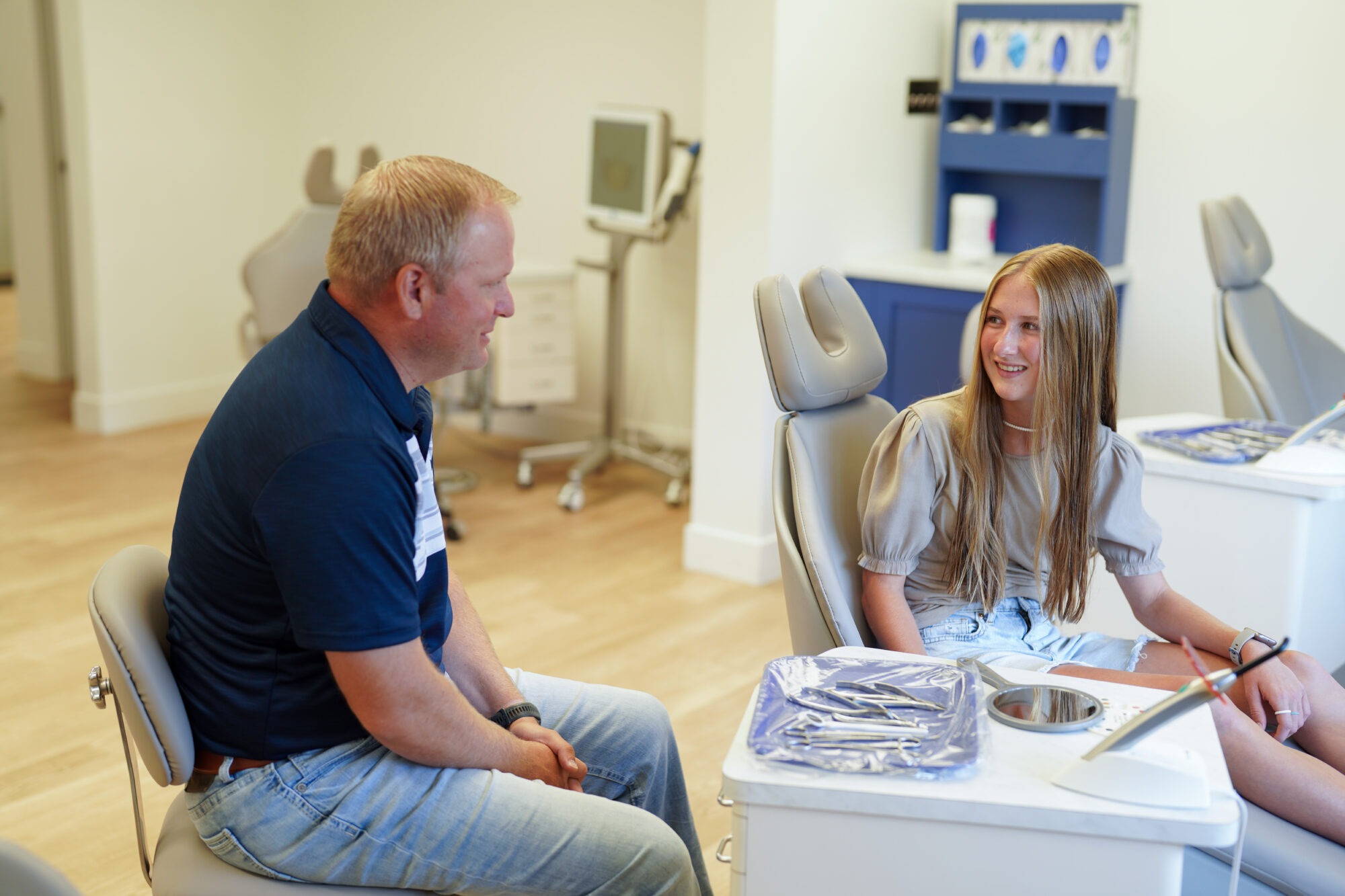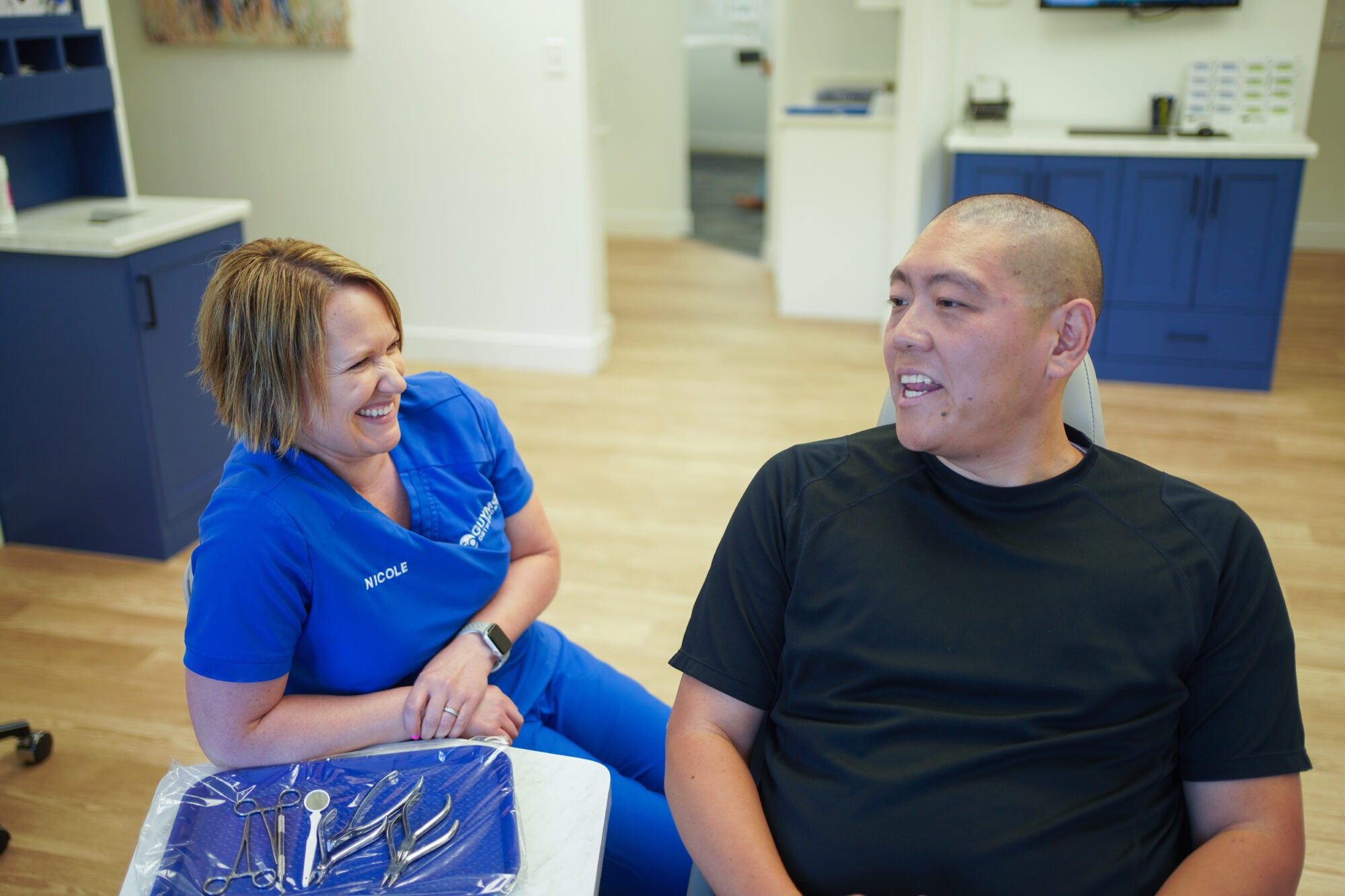At Guymon Orthodontics, your smile is our passion! Dr. Guymon and the team are serious about giving you all the tools you need to have the healthiest, happiest smile possible. You may not have heard of Bruxism, but some of you will be familiar with its effects. Today, we’re going to talk about bruxism (aka teeth grinding in your sleep), how it affects your life, and what you can do about it. So, let’s get into it!
Bruxism – What Is It?
Bruxism is the proper name for grinding your teeth, often during sleep, but it also applies to tooth grinding when awake. This habit can put extra pressure on your teeth and jaw, which can be seriously problematic for your orthodontic well-being!
One of the biggest issues with bruxism is the fact that it often goes under the radar until it’s caused some major problems.
Causes of Bruxism
Bruxism might seem mysterious, but there are clear reasons why it happens. Let’s take a closer look at what could be causing this teeth-grinding habit:
Stress and Anxiety
One common trigger for bruxism is stress and anxiety. When you’re feeling tense or overwhelmed, your body’s way of coping might involve clenching or grinding your teeth. It’s like your teeth are responding to your emotions, even when you’re not aware of it. This constant pressure can lead to discomfort and dental problems over time.
Dental Factors
Sometimes, the way your teeth fit together can contribute to bruxism. If your teeth don’t align properly, it can cause your jaw muscles to work harder than they should, leading to grinding and clenching. This is known as malocclusion, and it’s more than just a tongue-twister – it’s a potential cause of bruxism.
Lifestyle Influences
Certain lifestyle factors can also play a role. Consuming too much caffeine or alcohol, smoking, and using recreational drugs can increase your chances of developing bruxism. These substances can disrupt your sleep patterns and make you more prone to teeth grinding during the night.
Medical Conditions and Medications
Bruxism is also linked to certain medical conditions, such as Parkinson’s or GERD (gastroesophageal reflux). Some medications, like antidepressants, can also trigger bruxism as a side effect. It’s important to be aware of these potential connections, especially if you notice signs of bruxism developing.
You can use this list to get an idea of factors that may be contributing to that nightly tooth-grinding. But what are the side effects? Let’s talk about that next.
Symptoms and Signs
There are a number of different signs that you can use to identify bruxism in yourself, a partner, or your child. Here are a few of them:
Dental Symptoms
Bruxism can leave telltale signs on your teeth. If you notice your teeth becoming sensitive to hot or cold temperatures or flattened or chipped edges on your teeth, it might be due to grinding. Over time, bruxism can wear down the enamel, the protective outer layer of your teeth, leading to increased sensitivity and even tooth damage.
Jaw Discomfort and Headaches
Frequent clenching and grinding can strain your jaw muscles, causing pain or discomfort. If you wake up with a sore jaw or experience unexplained headaches, bruxism could be the issue. These symptoms can extend to your neck and even your ears.
Sleep-Related Signs
Bruxism often occurs during sleep, and this can lead to sleep-related symptoms. If you wake up with a tired or tense feeling in your jaw or notice a partner mentioning grinding noises during the night, these are potential indicators of nighttime teeth grinding.
Signs in Children
Bruxism isn’t exclusive to adults – children can also develop this habit. If you notice your child grinding their teeth, especially during sleep, it’s essential to address it early. Additionally, keep an eye out for complaints of jaw pain or headaches, as these could be signs of bruxism in children.
Treatment and Management Options
If you or a loved one deal with tooth-grinding at night, don’t worry! There are plenty of treatment options available! Let’s take a look at some of them now.
Orthodontic Interventions
Correcting malocclusions through orthodontic treatments like braces or aligners can help alleviate the strain on your jaw and reduce the grinding and clenching associated with bruxism.
Nightguards and Splints
To protect your teeth from the damaging effects of bruxism, our experienced team can design custom nightguards or splints. These act as a barrier between your upper and lower teeth, preventing direct contact and reducing the impact of grinding.
Stress Management Techniques
Since stress and anxiety can trigger bruxism, adopting stress management techniques can be beneficial. And these are great since they’ll have a bunch of beneficial effects unrelated to your tooth grinding, as well! We could all use a little less stress in our lives!
Lifestyle Adjustments
Making positive changes to your lifestyle can also contribute to bruxism management. Limiting caffeine and alcohol consumption, quitting smoking, and avoiding recreational drugs can all play a role in reducing the likelihood of teeth grinding.
Medications and Professional Guidance
In severe cases of bruxism, medications can help to relax the jaw or deal with any underlying conditions. It’s important to remember only to take medications as prescribed by your doctor, though!
Call Us Now for All Your Orthodontic Needs!
Thanks so much for taking the time to learn more about bruxism and what you can do about it with Guymon Orthodontics. We’re proud to be Logan and Hyrum’s orthodontic solution, and that extends to dealing with bruxism or anything else! We offer totally free consultations, so there’s nothing holding you back from the healthiest, happiest smile you’ve ever had! We can’t wait to meet you!



